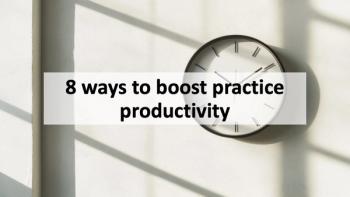
Four ways to maintain productivity
Here's how to ensure that you can continue to be a high-performing professional.
You are a productivity machine, tackling all kinds of tasks during the day. In many respects, you've exceeded your own expectations when it comes to fulfilling the responsibilities of your position. What's more, others recognize your contribution, and you're glad that they do. How often, though, have you taken care of smaller items related to your health and well-being to ensure that you can continue to be a high-performing professional?
If it's been a while since you have stopped to consider what you need to have in place to keep you-the productivity machine-in top condition, here are some suggestions to put into practice:
1) Get a regular health checkup.
If it turns out that everything is A-OK, fantastic. If you nip some potential problem in the bud, way to go! Depending on the particulars of your physiology, once you’ve passed a certain age, you undoubtedly know the value of having a regular checkup.
2) Assess your diet.
What do you eat, and when? Do certain food or meal times make you feel better or worse? Similar to a regular health checkup, a nutritional assessment on a periodic basis can give you vital information regarding your potential long-term health and well-being.
3) Exercise.
Are you getting a fair amount of physical activity on a regular basis? You've undoubtedly heard the axiom about walking 10,000 steps a day. For many people, that equals a vigorous, one-hour walk. Fortunately, it doesn't all have to be done at the same time. If you have four to five opportunities throughout the day to walk for 10 to 15 minutes, it all adds up.
You don't have to exercise every single day. For most people, three to four times a week will do, and the workouts can be divided up as two times at the gym and two times with home exercise equipment or walking vigorously. The great news about exercise is that the rewards come almost immediately.
4) Leave work on time.
You need to have time for a life after work. If you're staying too late, too often, it can diminish your overall capabilities and your enthusiasm for the job itself. Make it a habit of doing today's work today and departing at a reasonable hour. That is your best strategy for long-term effectiveness.
Jeff Davidson is "The Work-Life Balance Expert®" and a thought leader on work-life balance issues. He speaks to organizations that seek to enhance their overall productivity by improving the work-life balance of their people. Visit
Newsletter
Optimize your practice with the Physicians Practice newsletter, offering management pearls, leadership tips, and business strategies tailored for practice administrators and physicians of any specialty.






